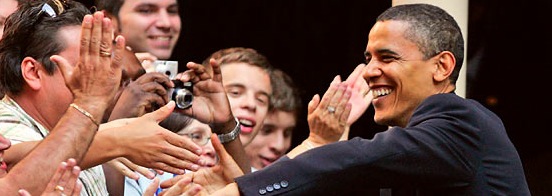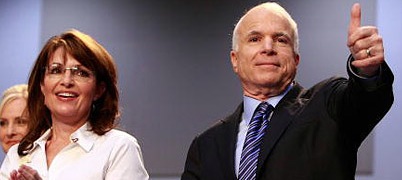That the prolonged contest for the American presidency last year marked one of the epoch political battles in U.S. history goes virtually without saying. Rarely has a national election been so fiercely challenged, so infused with meaning, so weighted by widely swinging dramatic arcs, and so blessed by such an engrossing cast of characters. It was, without question, what political insiders refer to as a "change election"--a significant, paradigmatic shift in the national polity.
A generation ago it would have been said that the campaign was fought out each evening on the network newscasts, but in the age of the Internet and 24/7 news cycles, the fact of the matter is that the combat was nearly incessant, seemingly without pause.

The highly contested nature of the 2008 election inevitably lent itself to sports metaphors, invoked not only by the media, but, apparently, by the candidates and political operatives themselves. In November 2006, Obama's sagelike campaign strategist David Axelrod drafted a memorandum in which he was brutally direct with the candidate:
"I don't know whether or not you are Muhammad Ali or Floyd Patterson when it comes to taking a punch. You care far too much what is written and said about you. You don't relish combat when it is personal and nasty."
This fascinating and revealing memorandum is explored at length in Dan Balz and Haynes Johnson's generally superb The Battle for America 2008: The Story of an Extraordinary Election, the only book yet published on the campaign that succeeds in capturing its entire dramatic arc.
Balz and Johnson, both veterans of the Washington Post's formidable national bureau, generally opt for the boxing metaphor in their reporting. In that respect, they view the real heavyweight battle in 2008 as the one fought between Hillary Clinton and Obama in the Democratic primaries.
The Battle for America opens with a telling vignette in which Obama and both Hillary and Bill Clinton appear at a memorial march in Selma, Ala., in the winter of 2007. Afterward, Obama is waiting in a small plane on the tarmac of the Selma airport as, first, Bill's motorcade pulls up to a Gulfstream jet, and the former president taxis down the runway.
Next it is Obama's turn--only the battery is dead in his plane. Hillary then emerges from her own, even larger motorcade, enters her Gulfstream and departs down the runway, while Obama is forced to wait for an electrical cord in order to jump-start his engine. The symbolic imagery of the situation is not lost on Obama, who declares, "I guess this really is a grassroots campaign."
Herein lies one of the two major historical questions of the 2008 election. How did Hillary Clinton, widely considered the frontrunner for the Democratic Party nomination and ahead of Obama by as much as 33 points in October of 2007, lose her lead and her seemingly inevitable presidency to the junior senator from Illinois--a candidate who had been a national figure for less than four years and whose sole claim to fame was a single speech delivered at the 2004 Democratic national convention in Boston?
The simple answer is that Clinton and her campaign blew it. For all her steely posturing and assertion of leadership skills, Hillary Clinton was a hands-off manager, afraid to mix it up in the rough and tumble of interoffice infighting. The Clinton campaign, as Evan Thomas describes it in the compact though well-crafted and insightful The Inspiring, Combative 2008 Campaign and the Historic Election of Barack Obama, was defined by "crisis, chaos, deceit and subterfuge"--and that was putting it mildly. The Clinton team's confidence soon begat arrogance, complacency and a sense of entitlement--all deadly ingredients in a run for the White House.
But as Richard Wolffe argues in his elegant, if at times gushing, Renegade: The Making of a President, that was only half the answer to the question. The other half was that the Obama camp was simply masterful in its execution throughout the primaries. In this respect, Wolffe favors basketball metaphors in his intimate portrait of Obama:
Politics was no pastime for Barack Obama, but it tested him in similar ways to his beloved basketball. The campaign challenged his character and his strategy. To win, he needed to demonstrate what kind of game he could play. Was he a high-minded purist who never threw an elbow? Could he keep his cool while his opponents tried to rattle him? Was he all hope and no fight?
As the campaign wore on, Obama's--and Axelrod's--ability to keep their heads calm when those about them lost theirs enabled them to take advantage of every little mistake made by the Clintons.
The other major question lingering from the 2008 campaign is whether or not John McCain's selection of Sarah Palin as his running mate cost him the election, or if his loss was a fait accompli, no matter whom he chose. This is a much more dicey matter, as McCain's political operatives try to salvage their reputations in the aftermath of their loss and as startling revelations about Palin's behavior on the campaign trail continue to leak slowly, albeit steadily, from McCain operatives.
In the aftermath of Obama's significant electoral victory, the McCain campaign has done its best to argue that the loss was inevitable, no matter who he chose, no matter what they did. The most vehement of these spin doctors has been Rick Davis, McCain's controversial lobbyist-cum-campaign manager, who was demoted not once, but twice, by McCain during the electoral process.
While the highly regarded Steve Schmidt--known as "The Bullet" in GOP circles--was eventually placed in charge of the campaign's day-to-day operations in July of 2008, it was Davis who was tasked with overseeing the vice-presidential selection process, and it was Davis who led McCain & Co. to Sarah Palin.
For those political junkies who crave the behind-the-scenes details of the various campaigns, it doesn't get much better than Campaign for President: The Managers Look at 2008, the transcripts of a two-day gathering convened at Harvard's Institute of Policy Studies in the immediate aftermath of the election. Many of the major players participated--including Davis and Bill McInturff from the McCain campaign and Axelrod and David Plouffe from Obama's--and their comments at the various sessions are transcribed essentially verbatim. It's the raw footage of the campaign, the nit and grit, without mediation by journalists or historians.

Davis and McIntuff did their best at Harvard to spin the Palin selection in a favorable light--"She was a maverick," Davis insisted--but the Obama camp would have none of it. Joel Benenson, Obama's chief pollster, noted that after Palin's devastating performance in her now infamous interview with Katie Couric, "Palin went from having, in our poll, the highest favorable/unfavorable ratio to the worst of the four principals. By the time she got to the vice-presidential debate, in our polling, her negatives were almost as high as her positives."
Davis and McInturff argued that the economic crash on Sept. 15, 2008, is what did in their candidate. It's an interesting piece of revisionist history, especially since the GOP, by McInturff's own admission, had gained considerable ground on Obama in August and had even take a 3-point lead in early September. As one former McCain strategist has acknowledged, "That position is intellectually dishonest."
If McCain had someone with economic credibility at his side like Mitt Romney or Tim Pawlenty during the financial meltdown in mid-September, rather than the economic neophyte like Palin hiding from the press, it remains uncertain what might have happened. This was the critical turn in the election. Obama was never particularly good at explaining his own economic policies, but compared to the seemingly hapless McCain, operating without a shotgun next to him, middle-of-the-road voters and independents swung toward the Democrats.
Shortly thereafter, Colin Powell--who questioned McCain's judgment in selecting Palin and who said, "I don't believe she is ready to be president of the United States"--announced his historic endorsement of Obama and Joe Biden. McCain never recovered from that point on.
In his classic work on the 1972 Presidential election, The Boys on the Bus, Timothy Crouse chronicled how gritty newspaper reporters helped to both shape and frame the national debate. In 2008, the real media vitality this time around was generated by bloggers across the country.
For far too many years, there's been a culture of "pack journalism" on the campaign trail, as embedded reporters feed off the same press releases and same handouts, fearing to break new ground. As Eric Boehlert notes in Bloggers on the Bus, his delightful chronicle of the progressive blogosphere (or "netroots nation," as it's known), independent voices from the Internet "influenced and altered the road to the White House." In particular, a rag-tag army of articulate progressive bloggers from Alaska did the public vetting of Sarah Palin that the mainstream media failed to do. They were ahead of the curve every step of the way.
As the dust from the 2008 race slowly settles--and as Obama struggles to forge new directions in health care and foreign policy in the face of vicious opposition from the conservative right--perhaps the most salient, long-distance analysis of the 2008 election is contained in the fascinating and brilliant Republican Gomorrah: Inside the Movement that Shattered the Party, by the young blogger, investigative journalist and videographer Max Blumenthal.
Blumenthal argues that "a culture of personal crisis" has transformed the Republican Party from a moderate-right coalition to one driven by extremists. Citing the work of psychoanalyst Erich Fromm (author of Escape From Freedom), Blumenthal asserts that the fear of freedom leads anxiety-ridden people to embrace a peculiar brand of Evangelical authoritarianism that has fueled the likes of Sarah Palin. It's a chilling portrait of the dark underbelly of right-wing politics in this country, one that is holding not only the Republican Party hostage (and held McCain hostage in making his VP selection), but as Blumenthal argues, the entire American polity.
It's a disconcerting thought that, after such a grueling and, in many ways, definitive election, an even nastier, more prolonged battle is waiting just around the corner.

Award-winning writer and filmmaker Geoffrey Dunn's book The Lies of Sarah Palin: The Untold Story Behind Her Relentless Quest for Power will be released by St. Martin's Press in spring 2010.
Books Reviewed in this Essay:
The Battle for America 2008: The Story of an Extraordinary Election; by Dan Balz and Haynes Johnson; Viking; 415 pages; $29.95 cloth
Bloggers on the Bus: How the Internet Changed Politics and the Press; by Eric Boehlert; Simon & Schuster; 304 pages; $26 cloth
Campaign for President: The Managers Look at 2008; by The Institute of Politics (Harvard); Rowman & Littlefield Publishers, Inc.; 272 pages; 49.95 cloth; 29.95 paper
The Inspiring, Combative 2008 Campaign and the Historic Election of Barack Obama; by Evan Thomas; Public Affairs; 220 pages; $22.95 cloth
Renegade: The Making of a President; by Richard Wolffe; Crown; 356 pages; $26 cloth
Republican Gomorrah: Inside the Movement that Shattered the Party; by Max Blumenthal; Nation Books; 352 Pages; $25 cloth